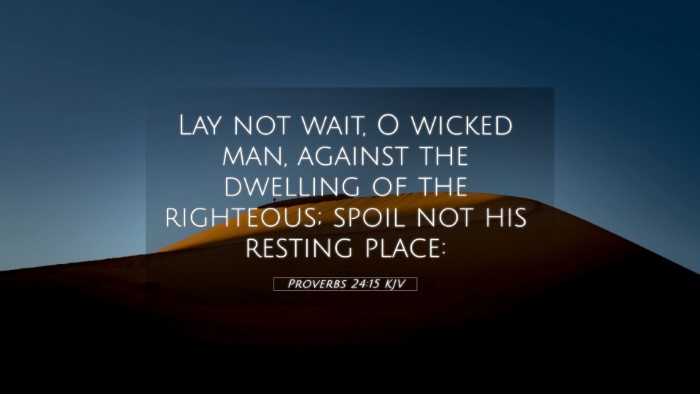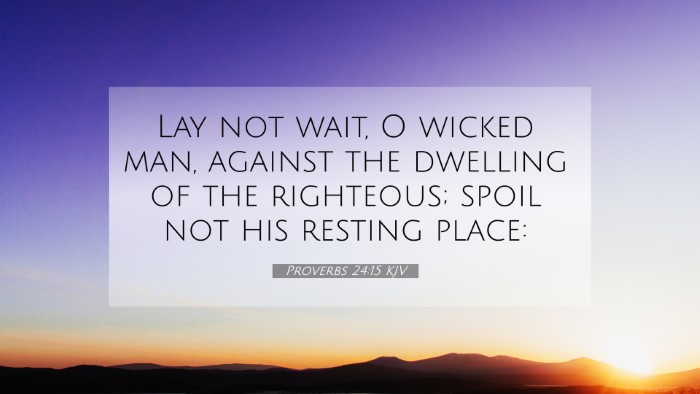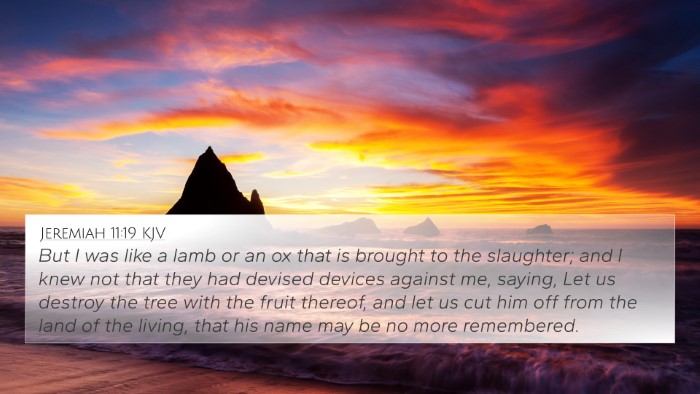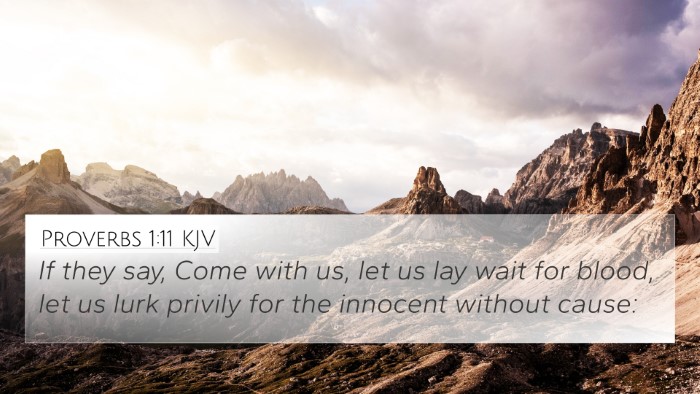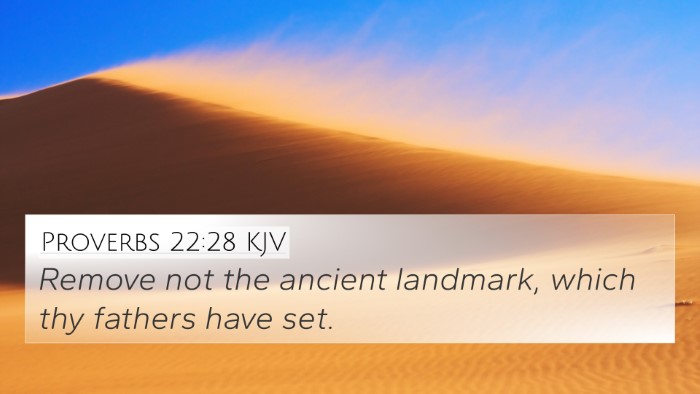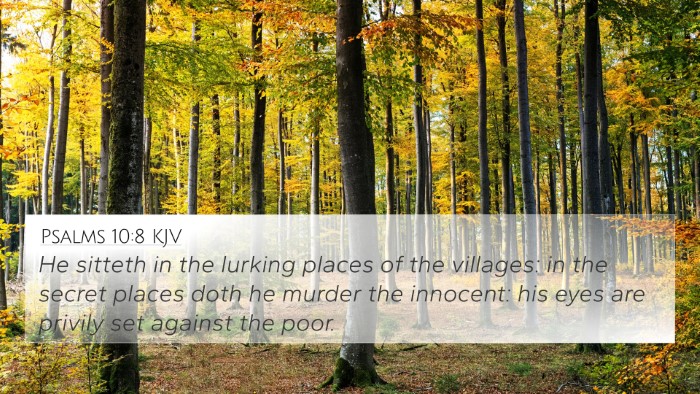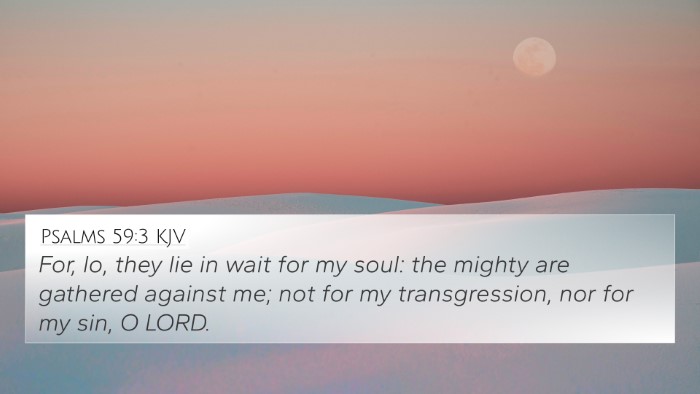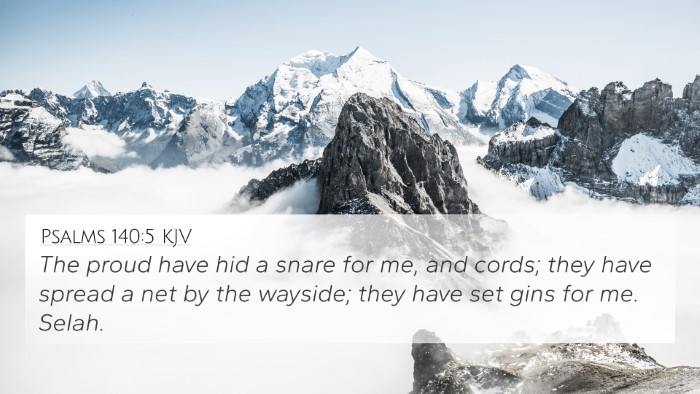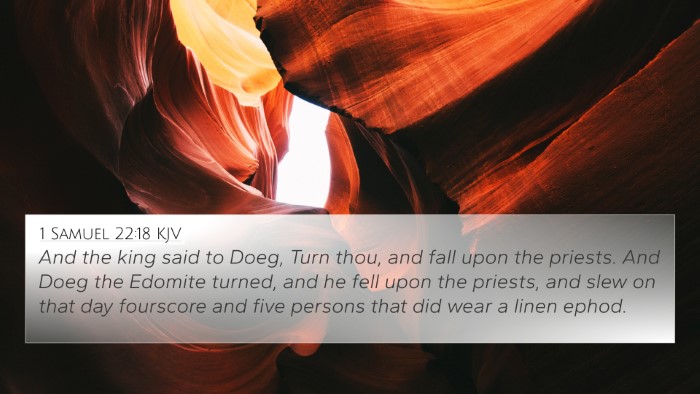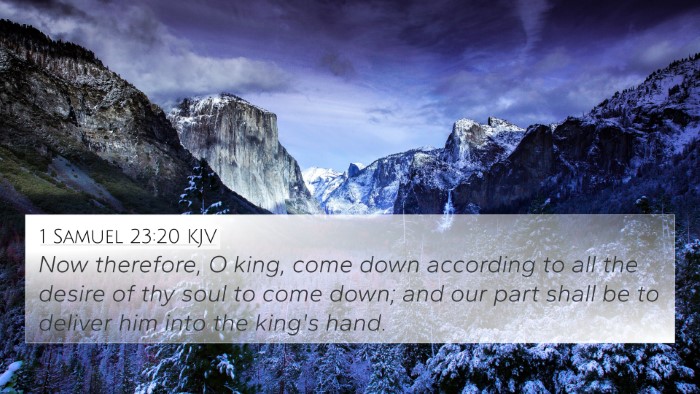Understanding Proverbs 24:15
Proverbs 24:15 states:
"Lay not wait, O wicked man, against the dwelling of the righteous; spoil not his resting place."
General Overview
This verse serves as a warning against malicious intent and actions directed toward the righteous. It calls attention to the unrighteous behaviors of those who would seek to harm or undermine the righteous, encouraging them to refrain from such actions.
Commentary Insights
According to public domain commentaries:
- Matthew Henry: He emphasizes the moral teaching that the wicked should not plot against the righteous, highlighting the divine protection over the righteous and the ultimate futility of wicked schemes.
- Albert Barnes: Barnes notes that the righteous are under God's protection and that any attempts to harm them are not only unjust but also foolish. He argues that such actions are likely to rebound upon the wicked themselves.
- Adam Clarke: Clarke interprets this verse as an appeal to the conscience of the wicked, reminding them that their actions toward the innocent can lead to their own ruin. He discusses the broader implications of divine justice that befall those who pursue evil.
Key Themes
- Divine Protection: The righteous are shielded by God, making any wicked intentions futile.
- Moral Responsibility: Individuals are held accountable for their actions, especially when those actions seek to harm others.
- Consequences of Sin: Engaging in wrongful acts leads to eventual downfall and retribution.
Cross-References to Consider
Several other Bible verses resonate with the themes presented in Proverbs 24:15:
- Psalm 37:12-13: "The wicked plots against the just, and gnashes upon him with his teeth. The Lord shall laugh at him: for he sees that his day is coming."
- Proverbs 11:21: "Though hand join in hand, the wicked shall not be unpunished: but the seed of the righteous shall be delivered."
- Isaiah 54:17: "No weapon that is formed against thee shall prosper; and every tongue that shall rise against thee in judgment thou shalt condemn..."
- Romans 12:19: "Dearly beloved, avenge not yourselves, but rather give place unto wrath: for it is written, Vengeance is mine; I will repay, saith the Lord."
- Galatians 6:7: "Be not deceived; God is not mocked: for whatsoever a man soweth, that shall he also reap."
- Psalm 1:6: "For the Lord knoweth the way of the righteous: but the way of the ungodly shall perish."
- Job 10:8-9: "Thine hands have made me and fashioned me together round about; yet thou dost destroy me. Remember, I beseech thee, that thou hast made me as the clay..."
Thematic Connections
This verse ties into broader Biblical themes:
- The Righteous vs. The Wicked: The ongoing struggle between those who live uprightly and those who pursue wickedness.
- God's Sovereignty: Assurance that God oversees the affairs of humanity, rewarding the righteous and punishing the wicked.
- Justice and Retribution: The inevitable outcome for those who choose to harm others versus the protection granted to the innocent.
Practical Application
Believers can apply the teachings of Proverbs 24:15 in their daily lives by:
- Being Watchful: Recognizing the potential evil intentions from others can help one remain vigilant.
- Practicing Integrity: Upholding righteousness without fear of opposition, trusting in God's protection.
- Seeking Justice: Addressing wrongdoings in a manner that reflects faith and reliance on God's ultimate justice rather than taking matters into personal hands.
Conclusion
Proverbs 24:15 serves as both a warning and a reassurance. It implores the wicked to abstain from their harmful intents and reassures the righteous of God's safeguarding presence. The complexities of moral choices are articulated through cross-referenced passages throughout the Bible, emphasizing inter-Biblical dialogue that enriches our understanding of justice, integrity, and divine protection.
Further Study Resources
Utilize tools for Bible cross-referencing such as:
- Bible Concordance: Helpful for finding related verses quickly.
- Bible Cross-reference Guides: Allows for exploration of themes and linked scriptures.
- Cross-reference Bible Study Methods: Equip you with techniques for deeper understanding.
Engaging in cross-referencing will deepen your insights into Biblical texts, providing clarity, context, and a comprehensive view of scriptural teachings.

